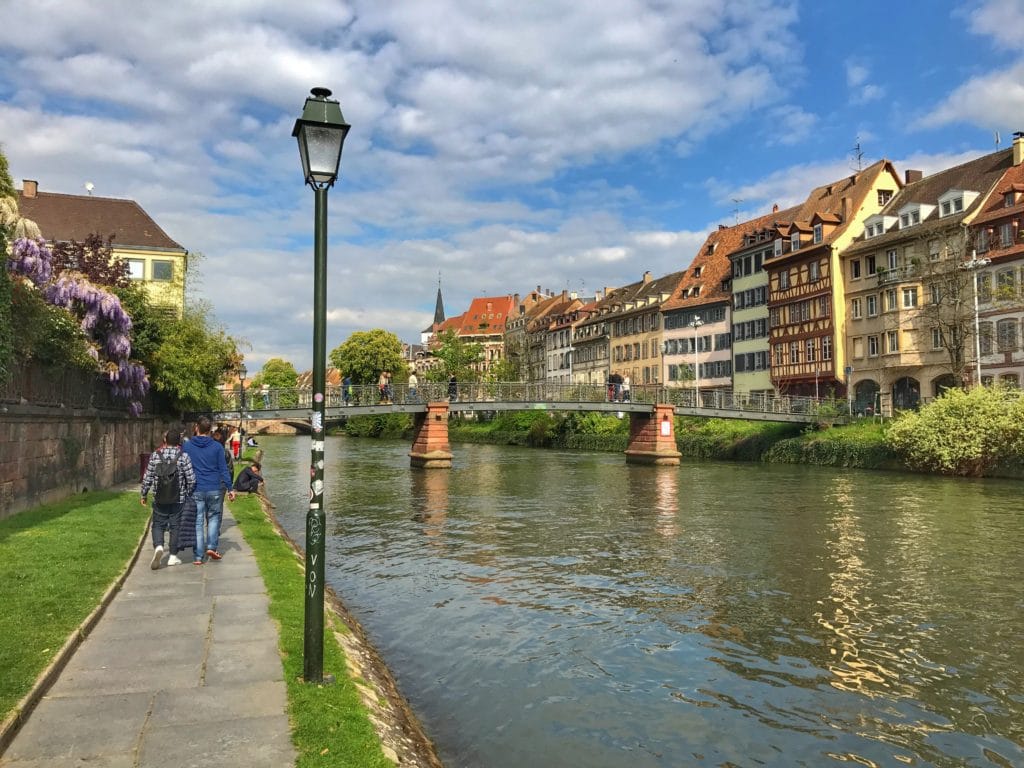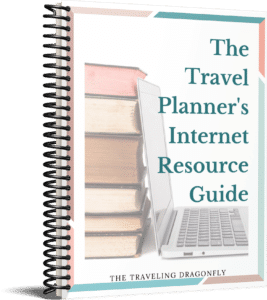
Looking for my top 10 tips for traveling abroad? You’ve come to the right place!
Traveling outside of one’s own country is by far the most eye-opening experience a traveler can have.
I remember my first time, well actually my third time, traveling outside the United States was the most eye-opening for me.
The first trip was to Canada on a family road trip when I was 10, the second time was a Caribbean cruise my senior year of college.
My third trip however was to France where I lived for five months.
Immersing myself into the culture and daily life where I grocery shopped, went to the postal office, ordered take-out pizza in French, rode the trams and trains on a daily basis…I learned more about myself than I thought possible.

If you are reading this, you’re probably considering a trip abroad – congratulations! It won’t necessarily be easy with all the unknowns you’ll be experiencing, but it will definitely be rewarding, I promise you!
And if you’ve already experienced life in another country and are looking for traveling tips – good for you! Knowledge is power and the more you know, the better prepared you can be!
So, with that being said, here are my top 10 tips for traveling abroad…and I can’t stress #4 enough! Let’s get to it!
If you have plans to travel to Scotland, check out the 11 Most Beautiful Places to Visit on the Trotternish Loop here.
This post may contain affiliate links, which means I’ll receive a small commission if you purchase through my links, at no extra cost to you. Please read my full disclosure for more information. Thank you for supporting my blog!
1. Check the weather where you’ll be traveling.
I know it seems obvious, but you’d be surprised how many people either don’t consider it, or assume the weather and temperatures are similar to where they live.
Traveling to Greece in March is COLD. Most people think of Greece being on the Mediterranean and the Mediterranean being a warm weather area.
Nope.
Greece is actually similar in latitude to Washington D.C. and we know the temperature extremes D.C. experiences!
Similarly, you should remember that countries south of the equator experience winter seasons opposite of the northern hemisphere.
And you need to check for the best time to visit. If you’re planning a trip to Peru, going in January or February might be less crowded, but their summer months are actually their rainiest, and their best weather is during their winter – May through October, when it’s driest.
Knowing the weather and climate you’ll be traveling in will help you make informed decisions regarding itinerary, what to pack, and means of transportation.
2. Have an idea of what the locals wear.
This might seem silly, but in my opinion blending in with the locals’ manner of dress (or at least not sticking out like a sore thumb) provides for a better cultural experience on several levels.
First, locals will respond more positively to you.
They are going to know that you’re a tourist…especially if it’s your first time in their country, but subconsciously people are more apt to respond favorably to you if you are dressed in a similar fashion.
For example, Italians love stylish clothing and they dress very chic when out and about.
Consider wearing a nice shirt and slacks rather than cutoff denim shorts and a tank top when visiting Rome.
Second, in some places there is a dress code.
Religious sites come to mind.

At the Vatican for example, anyone with an exposed midriff, shoulders, knees, or cleavage is denied entrance.
Know where you’re planning to visit and what, if any dress codes may be in place.
Thirdly, calling attention to yourself by dressing vastly different than the locals may expose you as a target for pick-pockets or situations where your personal safety might be called into question.
I’m not saying don’t dress in what is comfortable for you and I don’t recommend going out and buying a new wardrobe.
But do some research so you have an idea what is appropriate and expected.
You’ll feel more comfortable too if you’re not sticking out like a sore thumb!
3. Choose your travel bag according to your itinerary.

This tip for traveling abroad, or anywhere really, is important because having to wrestle with your luggage throughout your vacation does not make for a fun experience.
If you plan on changing locations often, travel using different modes of transportation, or walking distances with your luggage, you might want to consider using a travel backpack.
They are easy to carry, you don’t have to worry about rolling them on uneven ground and you can keep track of them and protect your belongings a lot easier since you are essentially wearing your luggage.
My favorite travel backpack is the Mother Lode Travel Backpack by eBags.
I took it on a two-week road-trip through Scotland and it made traveling SO easy! I also have their Mother Lode Rolling Travel Backpack that converts from backpack to a pull-along that I use depending on my itinerary.
However, if you’re traveling to one location and plan to stay there, more conventional luggage might be the way to go.
Especially if you plan on using private transportation and won’t be needing to carry your overstuffed 50-pound suitcase a mile from the train station to your hotel.
I typically pack a carry-on when I travel regardless of how long I’m traveling. For a hard-sided spinner carry-on option, I use the Fortis by eBags. I am obsessed with eBags as I love their products and have had great experiences with them.
It’s all about the experience and if you can minimize the hassles, you’ll go a long way towards having the best trip ever!
4. Learn a few basic phrases in the native language if it’s different from your own.
Even if you only learn how to say “Do you speak English” (for example) in their language, the locals will respond more favorably to you and be willing to help you then if you assume everyone speaks your language.
I’ll never forget learning this lesson big time while in Paris years ago.
I was eating at a nice restaurant with some fellow Americans and we were trying to speak French (some were doing better than others) but we were trying and the waiter finally took pity on us and began speaking to us in English.
We all laughed and had a great time.
He actually even helped our pronunciation a few times and made sure to give us a few pointers on what to see and do while in his city. Most importantly, he appreciated our attempt to speak his language.
While we were enjoying our lunch, two couples were seated at a nearby table and we knew right away they were Americans from their accents.
They made no attempt to speak French with the waiter, nor did they ask him if he spoke or understood English.
They just assumed that he did.
Our waiter was obviously offended and put off by their manner.
I don’t think they realized their actions were interpreted as rude by the waiter, I think they just didn’t know how inconsiderate their actions were.
Needless to say their dining experience was not nearly as good as ours!
It definitely pays to be respectful and polite to the people whose country you’re visiting.
A simple question of “Do you speak…”, goes a long way.
5. Know the exchange rates and your credit card and bank policies regarding international purchases.
My next tip for traveling abroad is all about the money!
Often, you’ll actually get a better exchange rate using a credit card than exchanging cash into local currency.
Contact your credit card company or personal bank, let them know what countries you’ll be traveling through and ask them the best way to make purchases.
This way you can advise them of your intended travel destinations and prevent your card from being shut down for what the card issuer may see as potential fraud.
Traveling on a budget? Here’s 10 ways to make your travel budget go further!
6. Embrace the cultures you encounter during your travels.

Be open to trying new foods, new experiences, and meeting new people.
Opportunities like this to open your mind and have new and different experiences are what makes travel so rewarding.
You learn just as much about yourself as you do the people you come into contact with.
After all, that is why you’re there right? If you aren’t open to embracing a new culture, you might as well stay home.
7. Make sure you have the appropriate power plug adapters for your electrical equipment.
Hairdryers, curling or flat irons, phone chargers, laptop and camera chargers – all need to be able to work while you’re away from home.
Having a universal travel adapter is the easiest way to ensure you stay charged and your equipment working.
I love this one I bought a few years ago from Amazon. It works in Europe, UK, Australia, and Japan.
And it has 4 USB ports as well!
8. Have copies of all your important travel documents with you.
Having a physical copy of your passport, drivers license, other picture ID, travel confirmations, etc., can go a long way towards making any potential disaster easier to overcome.
If you’re worried about losing the copies or having them stolen, keep images of them on your phone, in an email to yourself, or other online file that you can easily access if you need them.
Keeping a list of medical issues you have, medications you take, and names and contact information of your physician that can be easily found and accessed in an emergency is a good idea as well.
Knowing where your closest embassy is to your destination(s) and how to contact them is a good practice. You never know when you’ll need their services. You can check out their locations here.
No one expects to lose their passport or have their purse or wallet stolen, but things like that unfortunately do happen. Being prepared is the key to fixing the problem quickly and not allowing it to ruin your trip.
You also might consider giving someone your travel itinerary, especially if you’re traveling solo.
That way if you fail to return, someone can send out the search party!
Or at least make sure you’re safe and having a great time.
9. Travel Insurance
Any time you’re traveling outside your home country it’s ALWAYS a good idea to have travel insurance.
The cost of the insurance is just a drop in the bucket compared to the money you lose if something goes wrong and you have to cancel or end your trip early.
Also, contact your medical insurance provider and let them know where you’ll be traveling and ask them what (if any) procedures you should follow if you need medical attention while traveling in a foreign country.
They may or may not cover you, but it’s always good to know beforehand.
I recently ran across a great article by NerdWallet on how to find the best travel and medical travel insurance. Check out their article here if you want to learn more.
10. Read up on the history and culture of where you’re planning to travel.
Having an idea of the history of the area can make your experience so much richer and more rewarding.
You’ll be able to realize the significance of cultural and historic sites you’ll be seeing. You’ll understand how the culture has evolved into what you’re experiencing today, and have a greater appreciation of the people and their customs.
All these things we learn about while traveling; and it helps to realize the similarities and differences between your culture and the ones you come into contact with.
That’s it! My top 10 travel tips for traveling abroad.
Leave me a comment below on where you’re planning to travel and if you have any tips that you’d recommend and like to share. I’d love to hear from you!
Happy traveling and embrace your inner dragonfly!

Dreaming of a gorgeous Hawaiian island vacation? Check out this 7-day Hawaiian Island-Hopping Itinerary.



